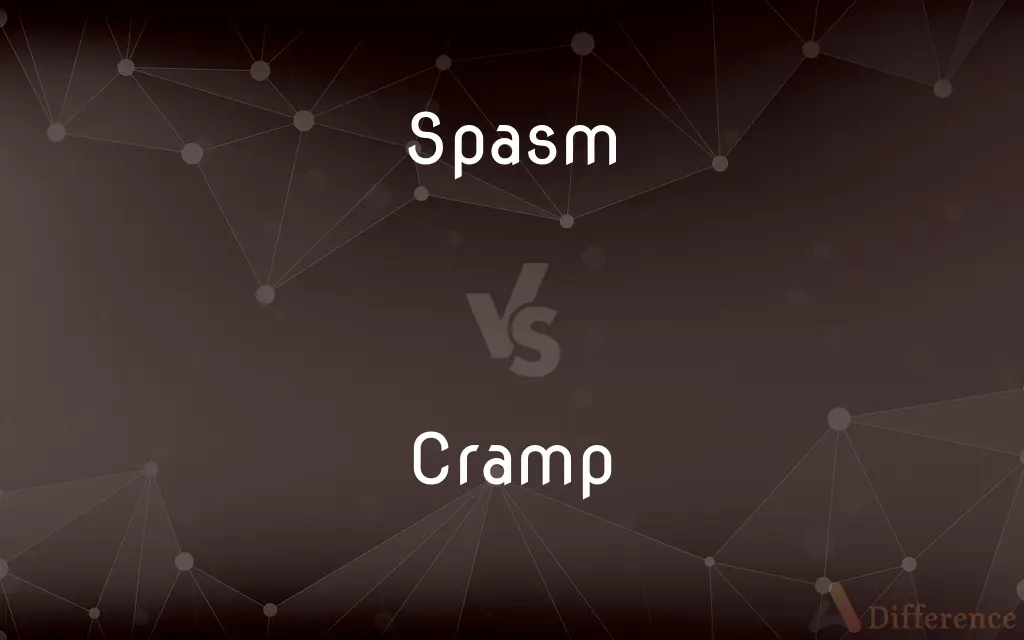Spasm vs. Cramp — What's the Difference?
By Tayyaba Rehman & Maham Liaqat — Updated on March 28, 2024
A spasm is a sudden, involuntary muscle contraction, often brief and without pain, while a cramp is a prolonged, painful contraction, typically caused by strain or overuse.

Difference Between Spasm and Cramp
Table of Contents
ADVERTISEMENT
Key Differences
Spasms are characterized by their sudden onset and brief duration, affecting various muscles and often occurring without a clear trigger. They can be symptomatic of neurological conditions or may happen randomly. Cramps, on the other hand, are known for their prolonged and painful nature, frequently resulting from muscle fatigue, dehydration, or mineral deficiencies. They are most common in the legs and feet, especially after extended periods of physical activity.
Spasms can affect anyone, regardless of their physical condition, and are not always associated with muscle overuse or dehydration. They might be a reaction to stress, fatigue, or even an underlying medical condition. Cramps, whereas, are more likely to affect individuals who are engaged in intense physical activities, are dehydrated, or have an imbalance in electrolytes. They are particularly common among athletes and those in physically demanding professions.
While spasms may not always require medical attention due to their brief and less severe nature, they can be alarming when they occur frequently or are associated with other symptoms, indicating a potential underlying condition. Cramps, on the other hand, can often be relieved through stretching, hydration, and rest, but recurrent cramps might necessitate a medical evaluation to rule out more serious conditions.
The treatment for spasms often focuses on relaxation and stress management techniques, such as meditation or yoga, to prevent their occurrence. Medications may also be used in cases related to neurological conditions. For cramps, treatment typically involves immediate actions like stretching the affected muscle, ensuring adequate hydration, and applying heat to relax the muscle.
Preventive measures for spasms include avoiding triggers known to cause them, such as certain medications or stress, and maintaining overall neurological health. Cramp prevention, however, emphasizes proper hydration, adequate mineral intake, and regular stretching before and after exercise to maintain muscle health and flexibility.
ADVERTISEMENT
Comparison Chart
Definition
Sudden, involuntary muscle contraction, usually brief and not always painful.
Prolonged, involuntary muscle contraction, typically painful, often due to strain or overuse.
Duration
Brief, lasting seconds to minutes.
Longer, can last for minutes to hours.
Pain
Not necessarily painful.
Usually painful.
Causes
Can be caused by stress, neurological conditions, or randomly.
Often caused by muscle fatigue, dehydration, or mineral deficiencies.
Treatment
Stress management, relaxation techniques, medication for underlying conditions.
Stretching, hydration, heat application, electrolyte balance.
Compare with Definitions
Spasm
A sudden, involuntary muscle movement.
She experienced a brief eye spasm while reading.
Cramp
A painful, involuntary muscle contraction.
He got a leg cramp while swimming.
Spasm
Can occur in any muscle group.
He felt a spasm in his shoulder while lifting.
Cramp
Often due to overuse or dehydration.
After the marathon, she suffered severe cramps.
Spasm
Quick, involuntary muscle contraction without pain.
A facial spasm crossed his face unexpectedly.
Cramp
Requires hydration and rest for recovery.
He drank water to recover from the cramp.
Spasm
May not require medical treatment.
The muscle spasm resolved on its own after a few seconds.
Cramp
May indicate electrolyte imbalance.
Electrolyte drinks can prevent exercise-induced cramps.
Spasm
Not always related to physical activity.
Stress caused a spasm in her back.
Cramp
Can be relieved by stretching.
Stretching helped alleviate her calf cramp.
Spasm
A spasm is a sudden involuntary contraction of a muscle, a group of muscles, or a hollow organ such as the bladder. A spasmodic muscle contraction may be caused by many medical conditions, including dystonia.
Cramp
A cramp is a sudden, involuntary muscle contraction or overshortening; while generally temporary and non-damaging, they can cause significant pain and a paralysis-like immobility of the affected muscle. Muscle cramps are common and are often associated with pregnancy, physical exercise or overexertion, age (common in older adults), or may be a sign of a motor neuron disorder.
Spasm
A sudden, involuntary contraction of a muscle or group of muscles.
Cramp
An involuntary, spasmodic muscle contraction causing severe pain.
Spasm
A sudden burst of energy, activity, or emotion.
Cramp
A temporary partial paralysis of habitually or excessively used muscles.
Spasm
A sudden, involuntary contraction of a muscle, a group of muscles, or a hollow organ.
Jessica went into spasms after eating a peanut.
Cramp
Cramps Spasmodic contractions of the uterus, such as those occurring during menstruation or labor, usually causing pain in the abdomen that may radiate to the lower back and thighs.
Spasm
A violent, excruciating seizure of pain.
Cramp
A frame with an adjustable part to hold pieces together; a clamp.
Spasm
A sudden and temporary burst of energy, activity, or emotion.
Cramp
A cramp iron.
Spasm
To produce and undergo a spasm or series of spasms.
Cramp
A compressing or restraining force, influence, or thing.
Spasm
An involuntary and unnatural contraction of one or more muscles or muscular fibers.
Cramp
A confined position or part.
Spasm
A sudden, violent, and temporary effort or emotion; as, a spasm of repentance.
Cramp
To affect with or as if with a cramp.
Spasm
A painful and involuntary muscular contraction
Cramp
To suffer from or experience cramps.
Cramp
To hold together with a cramp.
Cramp
To shut in so closely as to restrict the physical freedom of
Were cramped in the tiny cubicle.
Cramp
To steer (the wheels of a vehicle) to make a turn.
Cramp
To jam (a wheel) by a short turn.
Cramp
Cramped.
Cramp
A painful contraction of a muscle which cannot be controlled.
Cramp
That which confines or contracts.
Cramp
A clamp for carpentry or masonry.
Cramp
A piece of wood having a curve corresponding to that of the upper part of the instep, on which the upper leather of a boot is stretched to give it the requisite shape.
Cramp
(intransitive) (of a muscle) To contract painfully and uncontrollably.
Cramp
(transitive) To affect with cramps or spasms.
Cramp
To prohibit movement or expression of.
You're cramping my style.
Cramp
(transitive) To restrain to a specific physical position, as if with a cramp.
You're going to need to cramp the wheels on this hill.
Cramp
To fasten or hold with, or as if with, a cramp iron.
Cramp
(by extension) To bind together; to unite.
Cramp
To form on a cramp.
To cramp boot legs
Cramp
(archaic) cramped; narrow
Cramp
That which confines or contracts; a restraint; a shackle; a hindrance.
A narrow fortune is a cramp to a great mind.
Crippling his pleasures with the cramp of fear.
Cramp
A device, usually of iron bent at the ends, used to hold together blocks of stone, timbers, etc.; a cramp iron.
Cramp
A rectangular frame, with a tightening screw, used for compressing the joints of framework, etc.
Cramp
A piece of wood having a curve corresponding to that of the upper part of the instep, on which the upper leather of a boot is stretched to give it the requisite shape.
Cramp
A spasmodic and painful involuntary contraction of a muscle or muscles, as of the leg.
The cramp, divers nights, gripeth him in his legs.
Cramp
A paralysis of certain muscles due to excessive use; as, writer's cramp; milker's cramp, etc.
Cramp
To compress; to restrain from free action; to confine and contract; to hinder.
The mind my be as much cramped by too much knowledge as by ignorance.
Cramp
To fasten or hold with, or as with, a cramp.
Cramp
To bind together; to unite.
The . . . fabric of universal justic is well cramped and bolted together in all its parts.
Cramp
To form on a cramp; as, to cramp boot legs.
Cramp
To afflict with cramp.
When the gout cramps my joints.
Cramp
Knotty; difficult.
Care being taken not to add any of the cramp reasons for this opinion.
Cramp
A painful and involuntary muscular contraction
Cramp
A clamp for holding pieces of wood together while they are glued
Cramp
A strip of metal with ends bent at right angles; used to hold masonry together
Cramp
Secure with a cramp;
Cramp the wood
Cramp
Prevent the progress or free movement of;
He was hampered in his efforts by the bad weather
The imperilist nation wanted to strangle the free trade between the two small countries
Common Curiosities
What is a cramp?
A cramp is a prolonged, involuntary, and usually painful muscle contraction, typically caused by strain or overuse.
How can I relieve a cramp?
Stretching the affected muscle, ensuring adequate hydration, and applying heat can help relieve a cramp.
What causes cramps?
Cramps are often caused by muscle fatigue, dehydration, or an imbalance in electrolytes.
What is a spasm?
A spasm is a sudden, involuntary muscle contraction, often brief and not necessarily painful.
Can dehydration cause spasms?
While dehydration is a more common cause of cramps, it can also contribute to muscle spasms.
Can spasms be painful?
While spasms can be uncomfortable, they are not always painful.
What triggers a spasm?
Triggers for spasms include stress, fatigue, certain medications, or neurological conditions.
How can I prevent cramps during exercise?
Staying hydrated, ensuring adequate mineral intake, and stretching before and after exercise can help prevent cramps.
What is the best immediate treatment for a cramp?
The best immediate treatment is stretching the affected muscle, hydrating, and applying heat if necessary.
Can stress cause muscle spasms?
Yes, stress is one of the triggers that can cause muscle spasms in some individuals.
Are spasms serious?
Spasms can be a sign of an underlying condition if they occur frequently or are associated with other symptoms, warranting medical attention.
Can both spasms and cramps affect any muscle?
Yes, both spasms and cramps can affect any muscle in the body, though they have different causes and characteristics.
How long do cramps last?
Cramps can last from a few minutes to several hours, depending on the cause and treatment.
Are spasms and cramps the same?
No, they are different in terms of duration, pain, and causes, with spasms being brief and not always painful, and cramps being prolonged and painful.
Is stretching good for spasms?
While stretching is more commonly recommended for cramps, gentle stretching can also be beneficial for some spasms.
Share Your Discovery

Previous Comparison
House vs. Bungalow
Next Comparison
Mustaches vs. MoustacheAuthor Spotlight
Written by
Tayyaba RehmanTayyaba Rehman is a distinguished writer, currently serving as a primary contributor to askdifference.com. As a researcher in semantics and etymology, Tayyaba's passion for the complexity of languages and their distinctions has found a perfect home on the platform. Tayyaba delves into the intricacies of language, distinguishing between commonly confused words and phrases, thereby providing clarity for readers worldwide.
Co-written by
Maham Liaqat















































